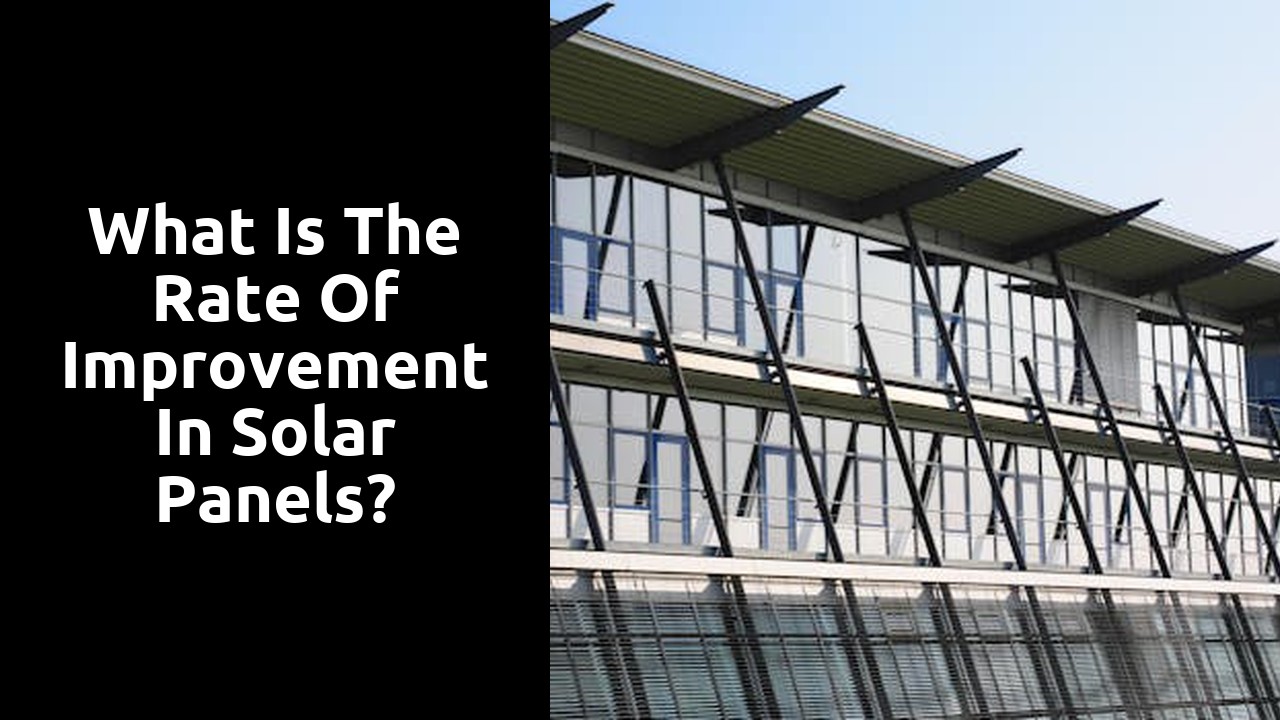
Future Prospects for Solar Panel Upgrades
Australia continues to lead the way in the adoption of solar energy, with advancements in technology and research driving significant improvements in solar panel efficiency. The focus on increasing the rate of Solar Panel System Performance Improvement is crucial for enhancing the overall viability and sustainability of solar energy systems in the future. As researchers continue to explore new materials and manufacturing processes, the potential for achieving higher conversion rates and enhanced durability in solar panels becomes increasingly promising.
Moreover, the integration of artificial intelligence (AI) and machine learning algorithms into solar panel systems presents exciting opportunities for further enhancing performance. By incorporating smart technologies that can monitor and optimize energy production in real-time, solar panels can operate at peak efficiency levels and adapt to changing environmental conditions. As these innovations become more mainstream, the future of solar panel upgrades looks to be characterised by unprecedented levels of sophistication and reliability, cementing the role of solar energy as a cornerstone of Australia's renewable energy landscape.
Predictions for the Next Generation of Solar Panels
Predictions for the Next Generation of Solar Panels
The future of solar panels looks promising as advancements continue to be made in the field of renewable energy. One key area of focus is the enhancement of Solar Panel System Performance Improvement through research and development efforts. With ongoing innovations in materials science and engineering, upcoming solar panels are anticipated to be more efficient and cost-effective, making them a more attractive option for both residential and commercial applications.
Moreover, as the demand for sustainable energy sources rises, there is a growing emphasis on integrating smart technologies into the design of solar panels. These next-generation solar panels are likely to feature improved energy storage capabilities and enhanced adaptability to varying weather conditions, thereby increasing their overall efficiency and reliability. By harnessing the power of innovation and technology, the future generation of solar panels is set to revolutionise the renewable energy landscape.
Economic Implications of Solar Panel Advancements
Solar panel advancements have led to significant improvements in efficiency and performance, making them a more attractive option for renewable energy sources. The economic implications of these advancements cannot be understated, as they have the potential to drive down costs and increase the affordability of solar power for consumers. As the technology continues to evolve, we can expect to see even greater improvements in Solar Panel System Performance Improvement, which will have a direct impact on the overall cost-effectiveness of solar energy systems.
Moreover, the advancements in solar panel technology are not only beneficial for consumers looking to save on energy costs, but also for the broader economy. The increased adoption of solar panels can stimulate job growth in the renewable energy sector, creating new opportunities for skilled workers. Additionally, as the cost of producing solar panels decreases, there is a ripple effect on prices for consumers, ultimately making solar energy a more viable and competitive option in the energy market.
Cost Considerations in Adopting New Solar Technologies
The cost considerations in adopting new solar technologies play a crucial role in determining the rate of improvement in solar panel systems. As advancements are made in the field of solar energy, the initial investment required for upgrading to more efficient panel systems needs to be carefully calculated and assessed. The key factor influencing cost considerations is the balance between the upfront expense and the long-term savings achieved through enhanced Solar Panel System Performance Improvement.
Moreover, the economics of transitioning to newer solar technologies need to be analysed in depth. Factors such as government incentives, tax rebates, and subsidies can significantly affect the affordability of upgrading to more efficient solar panels. It is essential for consumers and businesses alike to weigh the initial capital outlay against the potential long-term benefits achieved through increased energy efficiency and reduced operational costs. Effective cost considerations are pivotal in driving the adoption of innovative solar technologies and accelerating the overall rate of improvement in solar panel systems.
Regulatory Factors Influencing Solar Panel Evolution
Regulatory factors play a significant role in shaping the evolution of solar panel technologies. Government policies, incentives, and regulations can either accelerate or hinder the rate of Solar Panel System Performance Improvement. For instance, feed-in tariffs and net metering schemes can encourage the adoption of solar panels by providing financial incentives for households and businesses to generate their electricity. On the other hand, stringent permitting processes and regulations can create barriers to the widespread implementation of solar technology, slowing down the pace of improvement in solar panel efficiency.
In addition to government policies, international regulations and standards also have a substantial impact on the development of solar panels. Harmonized standards for solar panel efficiency and performance can facilitate global trade and technological advancements. Conversely, conflicting regulations and standards across different regions can create challenges for manufacturers and impede the dissemination of innovative solar technologies. Ultimately, a cohesive regulatory framework that supports research and development while ensuring market competitiveness is essential for driving continuous enhancements in Solar Panel System Performance Improvement.
Policy Frameworks Shaping the Future of Solar Energy
Policy frameworks play a crucial role in shaping the future of solar energy. Governments worldwide are increasingly implementing regulations and guidelines aimed at promoting the adoption and advancement of solar technologies. These frameworks not only focus on enhancing the efficiency and affordability of solar panels but also emphasize the need for sustainable energy practices. For instance, many countries are introducing incentives such as feed-in tariffs and rebates to encourage the installation of solar panel systems.
Additionally, policy frameworks often address issues related to grid integration and energy storage, ensuring that the transition towards solar energy is smooth and reliable. By establishing clear guidelines for solar panel installation and maintenance, governments can help boost consumer confidence and drive further innovation in the renewable energy sector. Overall, these regulations play a fundamental role in accelerating Solar Panel System Performance Improvement and shaping the future of solar energy on a global scale.
FAQS
What factors contribute to the rate of improvement in solar panels?
Various factors contribute to the rate of improvement in solar panels, including technological advancements, research and development efforts, regulatory frameworks, and economic incentives.
What are the future prospects for upgrades in solar panels?
The future prospects for upgrades in solar panels look promising, with ongoing research focusing on increasing efficiency, reducing costs, and integrating new technologies like energy storage and smart grid solutions.
What predictions are being made for the next generation of solar panels?
Predictions for the next generation of solar panels include increased efficiency levels, improved flexibility and durability, enhanced aesthetics, and the integration of advanced materials and manufacturing techniques.
What are the economic implications of advancements in solar panels?
Advancements in solar panels have significant economic implications, with the potential to drive down overall costs, increase energy independence, create new job opportunities, and boost local economies through investments in renewable energy.
What cost considerations should be taken into account when adopting new solar technologies?
When adopting new solar technologies, it is essential to consider factors such as initial installation costs, maintenance and operational expenses, financing options, available incentives, and the long-term return on investment.
How do regulatory factors influence the evolution of solar panels?
Regulatory factors play a crucial role in shaping the evolution of solar panels by setting standards for safety, quality, and performance, as well as providing incentives, subsidies, and policies that support the deployment of renewable energy technologies.
What policy frameworks are shaping the future of solar energy?
Policy frameworks at local, national, and international levels are shaping the future of solar energy by promoting renewable energy targets, implementing carbon pricing mechanisms, supporting research and development initiatives, and fostering collaborations between public and private sectors."""
